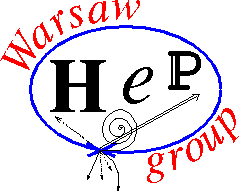SEMINARIUM FIZYKI WIELKICH ENERGII
Dnia 16 kwietnia (piątek) o godzinie 10:15, odbędzie się seminarium pt.:
Warsaw contributions to the 2021 International Workshop on Future Linear Colliders, LCWS2021 (part 1)
Referują:
Krzysztof Mękała: “CLIC sensitivity to invisible scalar decays”
The Compact LInear Collider (CLIC) is a proposed TeV-scale high-luminosity electron-positron collider at CERN. CLIC will allow us to study the Higgs boson properties with very high precision. These measurements can also result in direct or indirect discovery of „new physics”, Beyond the Standard Model (BSM) phenomena, which could help us to understand the nature of dark matter (DM). SM-like Higgs boson or new heavy scalar decays with emission of invisible DM particles can be the only way to observe „new physics” effects at achievable energy scales and establish connection between Standard Model and BSM sectors.
We studied the possibility of measuring invisible Higgs boson and additional heavy scalars decays with experiment at CLIC running at 380 GeV and 1.5 TeV. We estimated the expected limits on the invisible decays of the
125 GeV Higgs boson, as well as the cross section limits for production of an additional neutral Higgs scalar, assuming its invisible decays, as a function of its mass.
Kacper Nowak: ”Optimising top-quark threshold scan at e+e- colliders using genetic algorithm”
One of the important goals at the future e+e- colliders is to measure the top-quark mass and width in a scan of the pair production threshold.
However, the shape of the pair-production cross section at the threshold depends also on other model parameters, as the top Yukawa coupling, and the measurement is a subject to many systematic uncertainties.
Presented is the most general approach to the top-quark mass determination from the threshold scan at CLIC, with all relevant model parameters and selected systematic uncertainties and constraints from other measurements included in the fit procedure. The top-quark mass can be extracted with precision of the order of 30 to 40 MeV already for 100 fb-1 of data collected at the threshold. Additional improvement is possible if the running scenario is optimized: with the optimisation procedure based on the genetic algorithm the uncertainty can be reduced by about 25%.
Serdecznie zapraszamy
dr hab. Katarzyna Grzelak
prof. dr hab. Jan Królikowski
prof. dr hab. Aleksander Filip Żarnecki
The meeting will take place on zoom.us platform.
Join Zoom Meeting
https://us02web.zoom.us/j/
Meeting ID: 845 1609 6743
Passcode: HEP_UW

